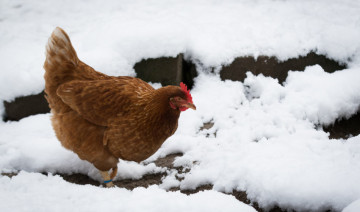{article.name}
How to Prepare Your Chickens For Winter

- Share this:
- Share on Facebook
- Pin on Pinterest
- Tweet on Twitter
Chickens are a surprisingly resilient bird where winter is concerned. This is especially true if your poultry belongs to one of the winter-hardy breeds such as Blue Andalusian, Dominique, Brahma, or Plymouth Rocks. Still, if a chicken coop is mismanaged or in poor shape during winter, the biting cold can bring about disease and sure death to its occupants. Among the multitude of improvements and reinforcements you should make to prepare your chickens for winter, the following tips are the most essential to keep in mind.
Good Air Flow
Ensuring that your chickens stay warm during winter is paramount, but proper air ventilation is just as important. Simply sealing off rarely-used openings may eliminate drafts, but doing so can increase humidity which is the main instigator of winter diseases in chickens. The main objective is to keep your coop warm yet dry, because any moisture that lingers can result in the chickens' death within. Mix and match the following solutions to facilitate warmth and good air flow in your coop:
- Screened windows: invest in small screened windows for your coop so that the windows can be open during the day and closed at night.
- consider installing a heater that may circulate air while keeping the coop warm.
- Inspect the coop; patch up any holes and cracks, seal off a vent or two if necessary and make sure the roof is water-tight.
Fortified Food And Warm Water
During spring, summer and fall your poultry is free to forage in addition to the food you provide. During the winter, this is entirely impossible, though a need for an increase in food as the weather grows colder is evident. To strengthen your chickens' condition, it is recommended that you infuse their food with vitamins in the weeks leading up to the peak of winter.
Fortified food is equally as important as warm, clean water where winter survival of chickens is concerned. Your chickens will rely on water to reinforce their body temperatures and to stay hydrated, and the cleanliness and warmth of their drinking supply is integral to both factors. The most straightforward method for ensuring that their water is warm is to invest in a warming bucket or a heated tank. This would provide the chickens with a constant supply without you having to warm and refill it for them. Breaking ice in nearby bodies of water is a good standby, but not something you should count on as their primary supply. Water Dirt and bacteria can accumulate in a body of water that has frozen over, making them hazardous to your birds.
Clean Bedding and a Clean Coop
Before doing any of the above, a winter cleaning of your chickens' coop is necessary. Even if you keep your coop relatively tidy, a thorough annual cleanout is paramount to a successful winter season. Follow these steps to keep your chickens healthy and happy in their home:
- Take everything out of the coop: removable perches, food containers, etc.
- Replace all broken or rusty items.
- Scrub the rest thoroughly.
- Examine the bedding; if the old bedding is still suitable, top it with a fresh layer. If not, replace it altogether.
Your chickens will likely survive this coming winter with even just the bare minimum in precautions. Keeping them dry yet warm, healthy and hydrated and increasing their food will reinforce their hardy nature. It will also lay the groundwork for a successful spring afterward.
Special Offers



Comments